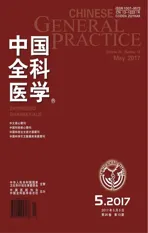《The Medical Republic》案例分享
——在预测严重疾病时,“第六感”能发挥作用吗?
2017-01-16LeonPiterman黄文静
Leon Piterman,黄文静,杨 辉
·世界全科医学工作瞭望·
《The Medical Republic》案例分享
——在预测严重疾病时,“第六感”能发挥作用吗?
Leon Piterman1,黄文静2,杨 辉1
全科医生;危重病;感觉
PITERMAN L,黄文静,杨辉.在预测严重疾病时,“第六感”能发挥作用吗?[J].中国全科医学,2017,20(13):1531-1533.[www.chinagp.net]
PITERMAN L,HUANG W J,YANG H.Can ′sixth sense′ play a role in serious illness prediction?[J].Chinese General Practice,2017,20(13):1531-1533.
日常生活中,我们经常会使用“第六感”这个词,一般情况下其指的是感知。很多人(可能不是所有的人)有时会产生一些特殊的想法或额外的感知,认为将会发生一些不好的事。
有些事情可能是让人不愉快的,而“第六感”使我们有能力去避免这些事情的发生。人体拥有5种以上的感觉,如嗅觉、味觉、视觉、听觉及触觉,这使我们能够感觉到疼痛、位置、温度及平衡,也有人认为人体有一种电磁感觉,可以预测天气的变化。《The Sixth Sense》是一部关于幽灵的电影,由海利·奥斯蒙、布鲁斯·威利斯及澳洲的托妮 ·科莱特主演。
在临床服务中,也常常会使用“第六感”这个词,是指医生怀疑可能会发生在患者身上的糟糕的事,即使这种怀疑很难取证于病史和实验室检查。医生会感觉到可能忽略了患者的某些情况,或者给予了患者不足甚至不当的治疗,亟须采取修正措施。这使医生很困惑,但却无法合理地描述出担心的原因。
接下来要讲述的患者故事,就是在描绘这种进退两难的情形,以及在应对困境时,医生的“第六感”所起的作用。
汤姆的故事
汤姆是一名72岁的退休锅炉制造工人,和68岁的妻子同住。他很积极地享受退休后的生活,平时会打高尔夫、钓鱼、参加长途徒步旅行。既往有高血压史,在口服血管紧张素转换酶抑制剂的情况下血压控制良好,无其他病史。既往吸烟,但在40岁出头时已经戒烟。
某个周五下午很晚的时候,在妻子的坚持下,他来到全科医学诊所就诊。就诊前他告诉妻子,在前一天的长途徒步旅行中感觉到了胸部紧缩和疼痛,约持续20 min,这迫使他停下脚步,待疼痛缓解后又继续行走。之后一直感到疲惫,但并未出现胸痛或其他症状。
查体过程中,患者一般情况较好,血压在参考范围内,心率68次/min,但心电图提示前胸导联缺血。为其安排了心肌酶和肌钙蛋白检查,几小时后,检验室电话通知检查结果正常。于是,为他开了阿司匹林,并嘱周一至诊所复诊,如再次出现疼痛症状,可打电话叫救护车。
按照排班,我周六上午在诊所当班。早晨醒来时,突然有种不安的感觉,心想自己对汤姆病情的处理是否过于草率?也许下周一太迟了,是否应该尽早采取一些干预措施?
我决定打电话给汤姆,并在上班的路上去他家进行家庭访视。汤姆感到很意外,但我的访视给他的妻子带来了安慰。汤姆表示,他在夜间再次发生了类似胸痛,约持续5 min,认为是阿司匹林导致的消化不良。
在接下来的查体过程中,汤姆出现了心脏停搏。他的妻子立刻打电话叫救护车,与此同时我开始为他行心肺复苏。心肺复苏成功了,汤姆被送到了当地的教学医院,病情稳定,之后在阻塞的冠状动脉处植入了3个支架。
我常常反思我对汤姆的处理过程,是不是应该在周五晚上就把他送到医院?但当时并没有任何心肌梗死的证据。根据周五采集的病史,医院会收他入院吗?他是否需要行紧急血管造影检查?
或许这些问题的答案是肯定的。很显然,我一直受到这些想法的困扰,而这些困扰也毫无疑问地影响了我,最终使我决定去做一个意想不到的家庭访视。是“第六感”让我感觉到有些地方可能做错了?还是简单的临床直觉让我对患者进行了更早的随诊?当汤姆出现心脏停搏时,我正好在他身边,这是幸运吗?还是“命中注定”和“第六感”,决定了这个还算不错的结果?
目前,尚没有科学证据支持全科医学中“第六感”的概念。但HJERTHOLM等[1]在《British Journal of General Practice》发表了一项研究,该研究调查了404例丹麦全科医生和4 518例患者,发现在全科医生怀疑患者患有肿瘤或其他严重疾病的情况下,为该患者安排的实验室检查是其他患者的两倍,全科医生希望通过大量的实验室检查来证实其所担心的问题。该研究的作者建议,在存在怀疑指征的情况下,全科医生应尽早为患者提供专科化的实验室检查。
那么,临床怀疑是“第六感”的同义词吗?也许是,也许不是。然而无论如何,自从经历过汤姆的病案后,我对心源性胸痛患者的管理方法已经永远地改变了。
志谢:特别感谢原文出版者《The Medical Republic》同意将此文编译后刊登于《中国全科医学》。
[1]HJERTHOLM P,MOTH G,INGEMAN M L,et al.Predictive values of GPs′ suspicion of serious disease:a population based follow-up study[J].Br J Gen Pract,2014,64(623):e346-353.DOI:10.3399/bjgp14X680125.
The term “sixth sense” is widely used in our daily lexicon and usually refers to the perception that, from time to time, many, if not all of us, have some special notion or extrasensory perception that something untoward is about to happen.
That something might possibly be unpleasant,and the sixth sense gives us the capacity to avoid that occurrence.Of course,we possess more than the five senses of smell,taste,sight,hearing and touch.We sense pain,position,temperature,balance,and some believe that we have an electromagnetic sense which can predict changes in the weather.TheSixthSensehas also been the subject of a movie about ghosts,starring Hayley Joel Osment,Bruce Willis and our own Toni Collett.
The sixth sense is also a term used in clinical practice where it refers to the notion that the doctor is suspicious there is something seriously wrong with the patient,even though it is difficult to define based on history and examination.There is a sense that something may have been missed,or that the management may be inadequate or even inappropriate,and steps need to be taken urgently to correct this.
The doctor remains troubled,but is not able to rationally pinpoint the cause for concern.
The patient that I describe below serves to illustrate the dilemma and the role of the sixth sense in dealing with it.
Tom′s story
Tom was a 72-year-old retired boilermaker who lived with his 68-year-old wife.He was active in retirement,playing golf,fishing and going on long walks.Apart from a history of hypertension,well controlled on an ACE inhibitor,he had no other medical problems.He had been a smoker,but had stopped in his early 40s.
He came to see me late on a Friday afternoon at his wife′s insistence.He had told her that on his long walk the previous day he had tight chest pain which lasted around 20 minutes,and caused him to stop walking.It eventually eased and he continued.He had since felt tired,but had had no further chest pain or other symptoms.
On examination he looked well,was normotensive with a regular heart rate of 68 b/m.However,an ECG showed evidence of ischaemia in the anterior chest leads.I arranged cardiac enzymes and troponin levels,which were phoned through to me several hours later and were normal.I prescribed aspirin and told him to see me again on Monday or call an ambulance if pain recurred.
I was scheduled to work at the clinic on Saturday morning.I woke with an uneasy feeling.Perhaps I was being too cavalier about Tom′s management.Maybe Monday was too far away and I needed to intervene earlier?
I decided to call in and do a home visit on Tom on my way to work.He was surprised to see me,although his wife expressed some relief at my visit.He had had another bout of chest pain during the night which lasted five minutes.Tom thought it was indigestion caused by the aspirin.
As I examined him he had a cardiac arrest.I began CPR while his wife called for an ambulance.He was resuscitated and taken to the local teaching hospital where he was stabilised,and subsequently had three stents inserted into blocked coronary arteries.I have often reflected on my management of Tom.Should I have sent him to hospital on the Friday night? There was no evidence of an infarct.Would he have been admitted with his history? Would he have had an urgent angiogram?
Perhaps the answers to these questions are "yes".It is clear that I remained troubled by these thoughts and no doubt they influenced me to undertake an unexpected home visit.Was it my sixth sense that something might be wrong,or was it simply common clinical sense to follow up earlier? Was it fortunate that I happened to be there when he had a cardiac arrest or did destiny,combined with a sixth sense,determine this favourable outcome?
There is little scientific evidence to support the notion of a sixth sense in general practice,but a study published by Hjertholm et al in theBritishJournalofGeneralPractice,involving 404 Danish GPs and 4 518 patients,showed that where the GPs were suspicious of cancer or other serious disease,investigations were twice as likely to reveal a serious cause for their concern than if they were not suspicious.
The authors recommend that GPs have urgent access to specialised investigation where there is an index of suspicion[1].
So is clinical suspicion synonymous with a sixth sense? Maybe,or maybe not.But,regardless,my management of patients with chest pain of cardiac origin has changed for evermore.
Reference
[1]HJERTHOLM P,MOTH G,INGEMAN M L,et al.Predictive values of GPs′ suspicion of serious disease:a population based follow-up study[J].Br J Gen Pract,2014,64(623):e346-353.DOI:10.3399/bjgp14X680125.
(本文编辑:王凤微)
Can ′Sixth Sense′ Play A Role in Serious Illness Prediction?
General practitioners;Critical illness;Sensation
R 197 R 395
A
10.3969/j.issn.1007-9572.2017.13.001
2017-03-31)
【编者按】 澳大利亚的全科医生具有行业自律性,体现在其自行制定行业标准、自主进行资质考核及自主执业等方面,也体现在《The Medical Republic》这一共享平台上。Leon Piterman是Monash University的副校长、全科医学教授,从事全科医学临床服务近40年,其建议我国的全科医生应培养“共和”思想,以为全科医学领域提供更多的平等交流机会。目前Piterman教授定期为《The Medical Republic》撰写文章,本刊深受“医学共和”思想的启发,特邀本刊编委Monash University杨辉教授对Piterman教授的文章进行编译,并将进行连载刊登,希望对我国的全科医生有所帮助和启发!本文中,Piterman教授讲述了自己对一例心源性胸痛患者的临床管理经过,并认为是“第六感”帮助其做出了正确的管理和修正措施,从而建议全科医生在临床工作中如果产生了患者可能患有更严重疾病的“第六感”,应尽早为其提供专科化的实验室检查,以避免严重事件的发生,敬请关注!
1.3168 Monash University,Melbourne,Australia
2.518003 广东省深圳市,罗湖医院集团黄贝岭社区健康服务中心
注:本文首次刊登于《The Medical Republic》
